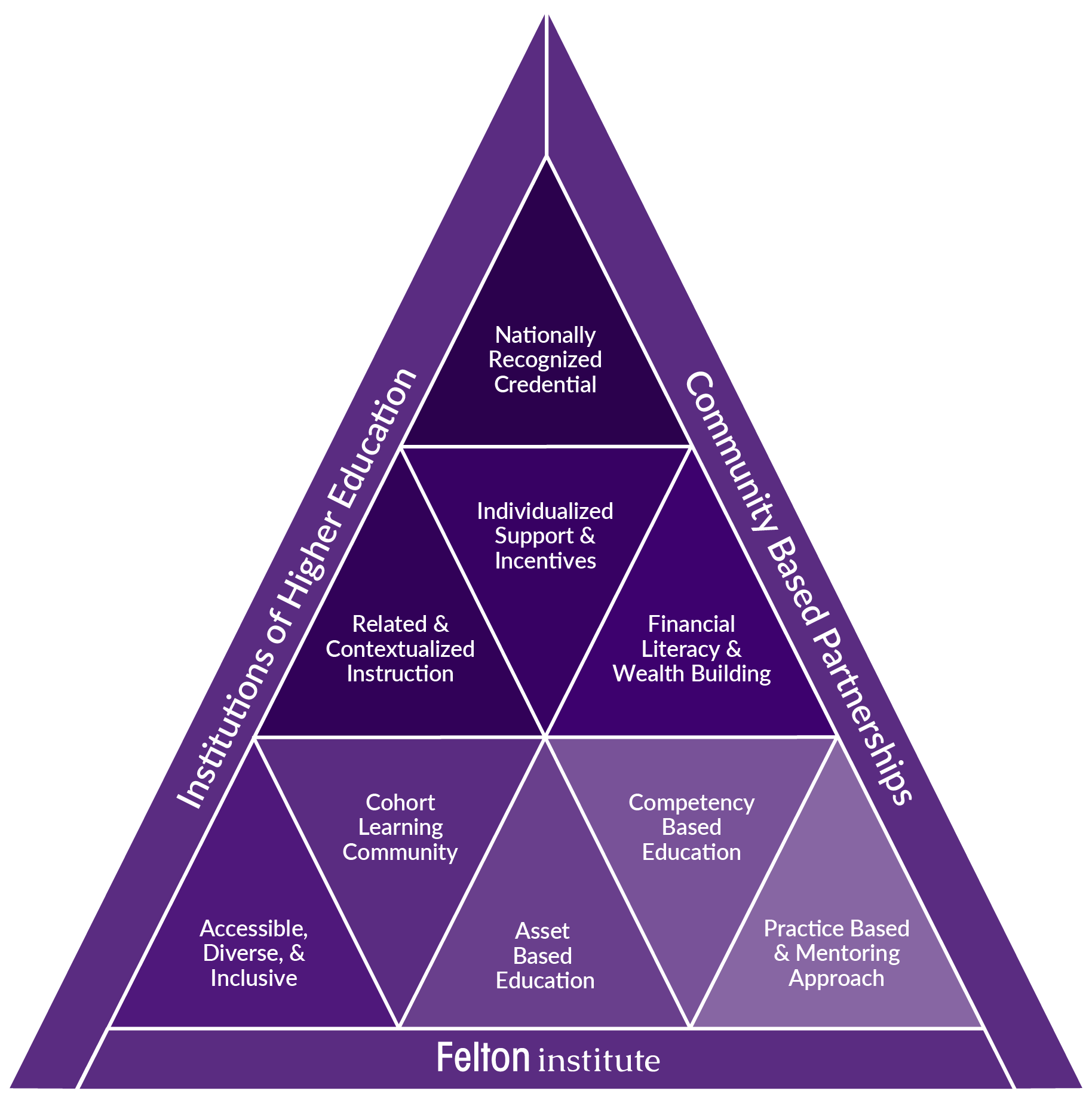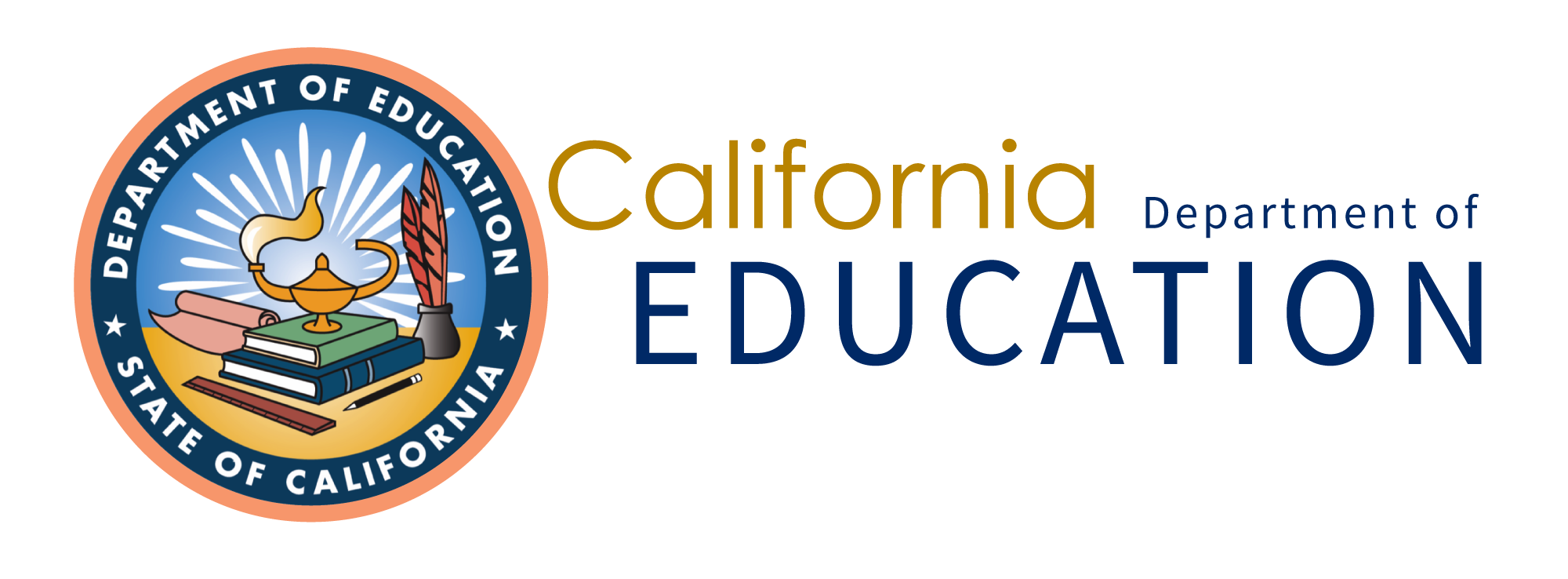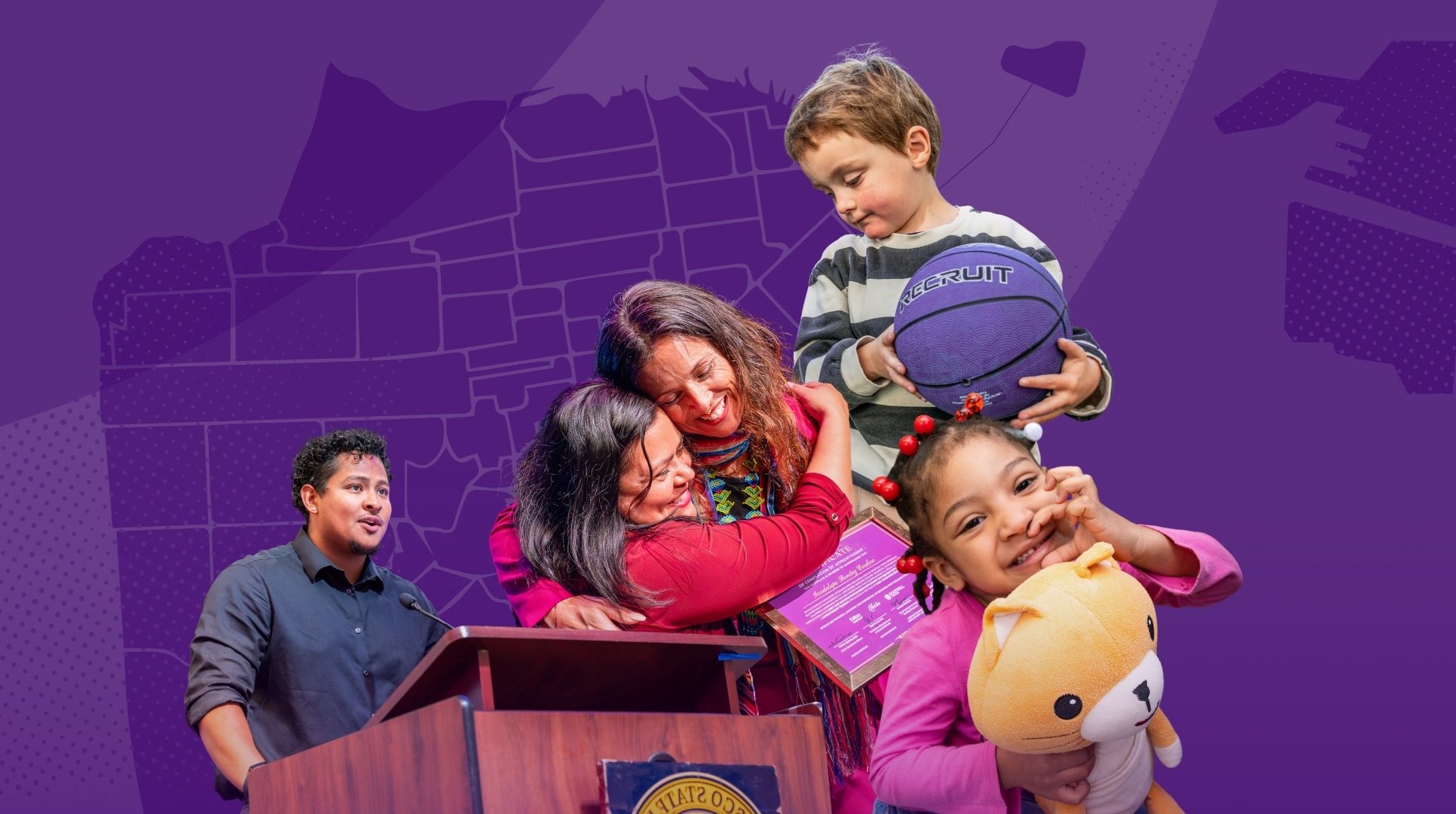
Since 1971, Felton Institute’s Early Care & Education (ECE) programs have stood at the intersection of compassion and innovation, providing equitable, nurturing support for children and families in San Francisco. What began as a single site has flourished with seven ECE locations serving San Francisco’s most underserved neighborhoods, including the Mission District, Bayview-Hunters Point, Visitacion Valley, among others. What guides this growth? A clear mission to respond to families facing poverty, trauma, and rising cost burdens. It’s more than “just childcare.” Felton’s model is rooted in whole-child, whole-family support. Our programs stretch far beyond the classroom, into homes and communities, meeting families where they are and walking alongside them every step of the way.
A Whole Child, Whole Family Model: An Anti-Poverty Strategy Rooted in Equity
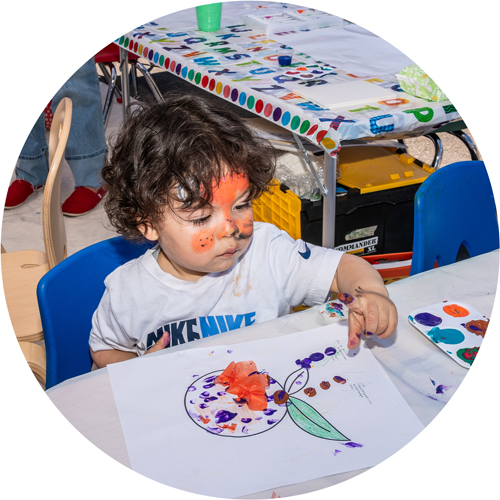
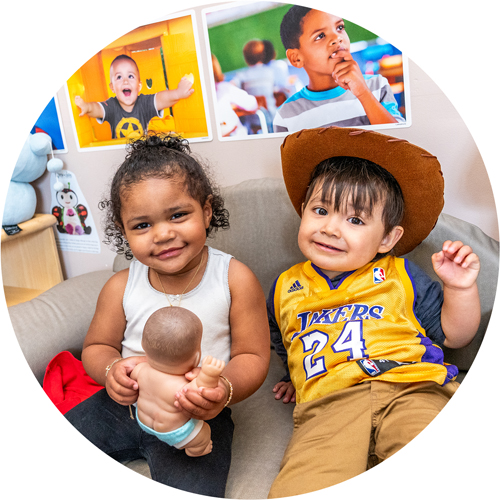
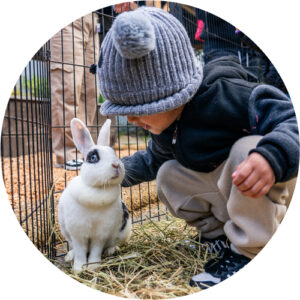
Our ECE model is built on the understanding that thriving children depend on thriving families. That’s why our approach goes beyond the classroom, offering a holistic, wraparound model. “Our mission is to address the medical, social, and educational needs of both the child and their family. In doing so, we lay the foundation for lifelong development, contribute to family economic success, and foster hope for a thriving future,” Chief Operations Officer and Capital Development Director, Dr. Yohana Quiróz said.
Our model integrates:
Early Care and Education
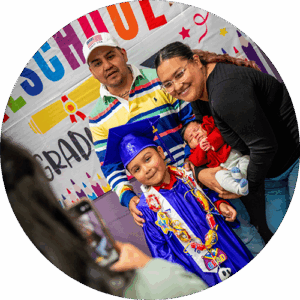 Felton’s inclusive, culturally responsive programs support at least 450 unduplicated children from birth to preschool in building a strong foundation for lifelong learning. Through play-based, developmentally appropriate experiences, children grow in early literacy, problem-solving, and social-emotional skills, which are key building blocks for kindergarten success. Rooted in the belief that every child is college-and career-bound, we foster a college-going culture from the start, cultivating curiosity, confidence, and a love of learning while honoring each child’s abilities, identity, language, and family values.
Felton’s inclusive, culturally responsive programs support at least 450 unduplicated children from birth to preschool in building a strong foundation for lifelong learning. Through play-based, developmentally appropriate experiences, children grow in early literacy, problem-solving, and social-emotional skills, which are key building blocks for kindergarten success. Rooted in the belief that every child is college-and career-bound, we foster a college-going culture from the start, cultivating curiosity, confidence, and a love of learning while honoring each child’s abilities, identity, language, and family values.
Early Intervention & Inclusion
For over five decades, Felton has provided inclusive early intervention services that support infants, toddlers, and preschoolers with developmental delays right in their natural environments. Delivered within culturally affirming, center-based ECE classrooms, these services are embedded directly into children’s daily routines. In partnership with the Golden Gate Regional Center (GGRC) and San Francisco Unified School District (SFUSD), Felton’s Early Intervention & Inclusion (EII) program supports children from birth to age five who meet one of four eligibility criteria: diagnosed developmental disabilities, developmental delays, established risk conditions, or other high-risk factors.
Family Support & Parent Education
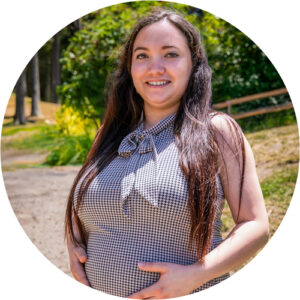 For more than 40 years, Felton has provided families, including teen parents, with educators to deepen their understanding of child development; strengthen parenting skills; and foster nurturing, safe home environments. Our model elevates parents as essential drivers of their children’s success.
For more than 40 years, Felton has provided families, including teen parents, with educators to deepen their understanding of child development; strengthen parenting skills; and foster nurturing, safe home environments. Our model elevates parents as essential drivers of their children’s success.
In this video, take a look inside the journey of the Hilltop High School class of 2025 and see what makes Felton’s Teenage Pregnancy and Parenting Program (TAPP) so unique.
Innovation Rooted in Equity and Community: Early Childhood Mental Health
Connect & Thrive (CAT): Healing Happens in Relationships
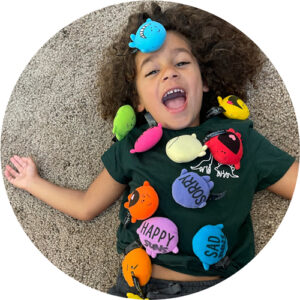 Innovation begins by listening to families, and Connect & Thrive (CAT) is a direct response to what they ask for: more than therapy. Launched in 2023, CAT reimagines early childhood mental health by focusing on the power of relationships. Rooted in Early Relational Health, the model offers child-parent psychotherapy, social-emotional learning, group healing circles, and peer support led by Parent Fellows, caregivers with lived experience, who now guide and uplift others in their community.
Innovation begins by listening to families, and Connect & Thrive (CAT) is a direct response to what they ask for: more than therapy. Launched in 2023, CAT reimagines early childhood mental health by focusing on the power of relationships. Rooted in Early Relational Health, the model offers child-parent psychotherapy, social-emotional learning, group healing circles, and peer support led by Parent Fellows, caregivers with lived experience, who now guide and uplift others in their community.
CAT weaves together clinical care and community wisdom into a multi-tiered system of support. The impact is already clear: one young mother, once in crisis, found healing, housing, and childcare. “When we think about children’s mental health, we’re really talking about their relationships,” said Michelle Kaye, Clinical Director of Children, Youth, Family and Transitional Age Youth (CYFTAY) Services. “We don’t just intervene. We connect. We nurture every single relationship a baby has because those relationships are what build resilience and well-being.”
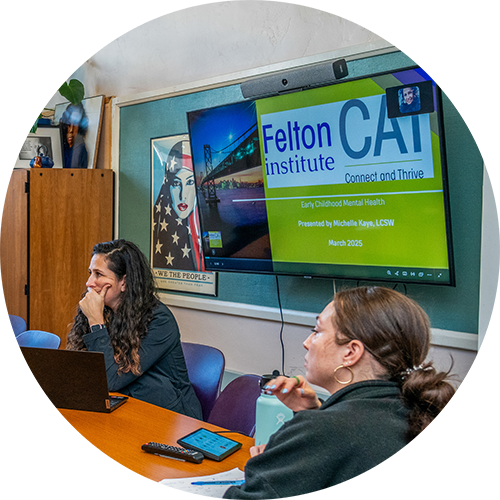 Connect & Thrive isn’t just about mental health; it’s a movement for community-led change, transforming trauma into resilience and building a future where families don’t just survive; they thrive.
Connect & Thrive isn’t just about mental health; it’s a movement for community-led change, transforming trauma into resilience and building a future where families don’t just survive; they thrive.
The CAT Program Model visualizes our multi-tiered framework for supporting children, families, and educators:
- At its base, Tier 1 Universal Supports ensure that every classroom and family has access to foundational tools like social-emotional learning (SEL) curricula, Center on the Social and Emotional Foundations for Early Learning (CSEFEL) training, and parent workshops.
- Moving upward, Tier 2 Targeted Interventions provide more personalized coaching, small friendship groups, and attachment-based programs for those who need additional support.
- At the peak, Tier 3 Specialized Interventions offer intensive, individualized care such as behavior support plans and child-parent psychotherapy.
Each tier is grounded in centering lived experience, early relational health, and a place-based approach, ensuring services meet people where they are.
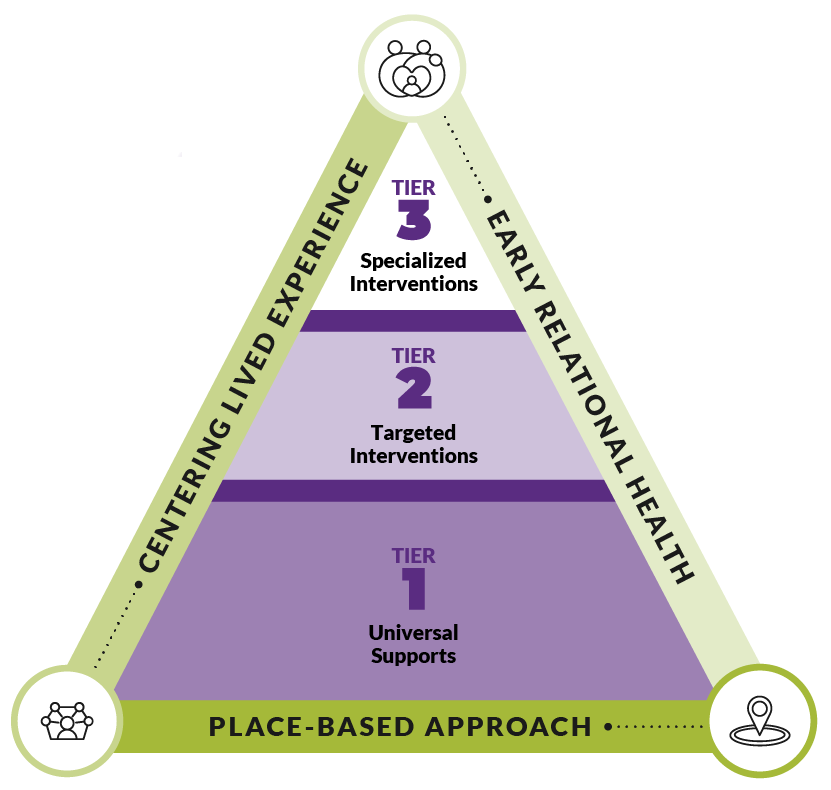
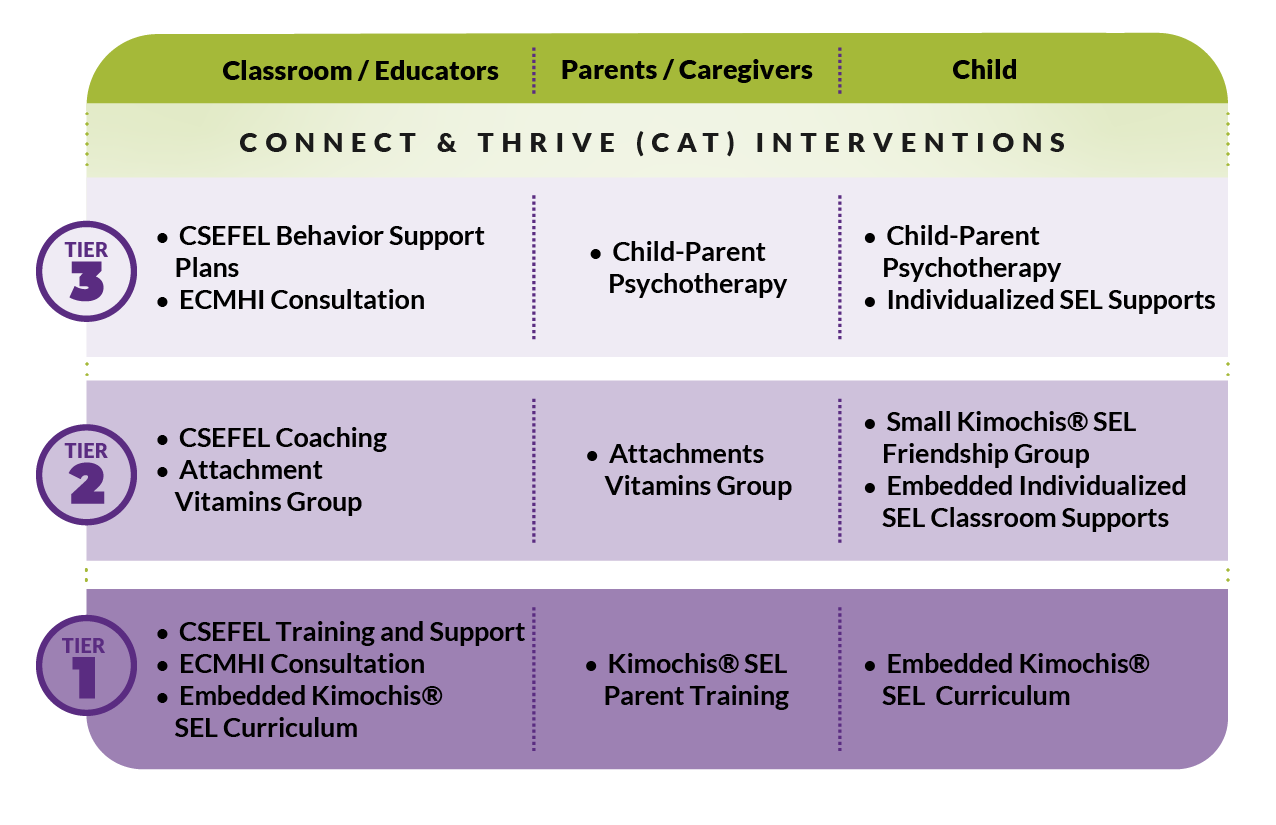 CAT Program Model: Open PDF Version
CAT Program Model: Open PDF Version
Workforce Development
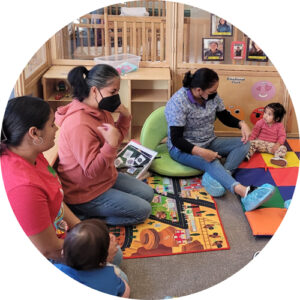 Alongside child and family services, launched in 2023, the Workforce Development via a pre-apprenticeship and apprenticeship model prepares early childhood educators, in Felton’s Early Care and Education, Realizing Employment And Creating Hope (ECE REACH) program for meaningful, sustainable careers. Its foundation is built on accessibility, diversity, inclusion, and a commitment to asset-based, competency-driven, and mentorship-supported learning. As educators progress, they benefit from cohort learning communities, contextualized instruction, and individualized supports and incentives, including financial literacy and wealth building opportunities. The model’s pinnacle is a nationally recognized credential, opening doors to career advancement and long-term stability.
Alongside child and family services, launched in 2023, the Workforce Development via a pre-apprenticeship and apprenticeship model prepares early childhood educators, in Felton’s Early Care and Education, Realizing Employment And Creating Hope (ECE REACH) program for meaningful, sustainable careers. Its foundation is built on accessibility, diversity, inclusion, and a commitment to asset-based, competency-driven, and mentorship-supported learning. As educators progress, they benefit from cohort learning communities, contextualized instruction, and individualized supports and incentives, including financial literacy and wealth building opportunities. The model’s pinnacle is a nationally recognized credential, opening doors to career advancement and long-term stability.
ECE REACH Apprentice Program Model: Open PDF Version
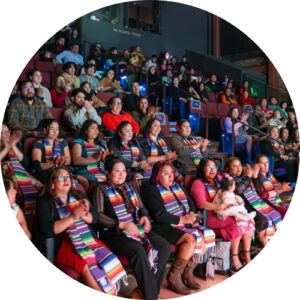 Together, these models ensure that Felton is not only nurturing children’s potential today but also building the skilled, empowered educator workforce and strong community partnerships needed for tomorrow. By addressing the needs of the whole child, whole family, and whole professional, we are creating an ecosystem where everyone can connect, thrive, and lead.
Together, these models ensure that Felton is not only nurturing children’s potential today but also building the skilled, empowered educator workforce and strong community partnerships needed for tomorrow. By addressing the needs of the whole child, whole family, and whole professional, we are creating an ecosystem where everyone can connect, thrive, and lead.
Check out this video to see the positive impact of our ECE REACH (Early Care and Education, Realizing Employment and Creating Hope) program.
ECE Co-location with Affordable Housing: Meeting Families Where They Are
San Francisco faces twin affordability crises: soaring housing costs and staggering childcare expenses. Nearly 25% of rented households spend more than half of their income on rent alone. Meanwhile, childcare costs rival rent in major U.S. cities, San Francisco among them, and are consuming as much as 50% of household income for many families with young children. A recent report (San Francisco Community Needs Assessment, 2024) found that a family of four needs approximately $134,211 per year just to meet basic needs, and 27% of households fall below that threshold.
Transforming Crisis into Opportunity
In partnership with affordable housing developers: Tenderloin Neighborhood Development Corporation (TNDC), Mission Economic Development Agency (MEDA), Chinatown Community Development Center (CCDC), Mercy Housing, and related, Felton responded not with temporary fixes but with sustainable, community-centered solutions. We have built and continue to build ECE right where families live on-site at affordable housing developments, embedded within supportive neighborhoods.
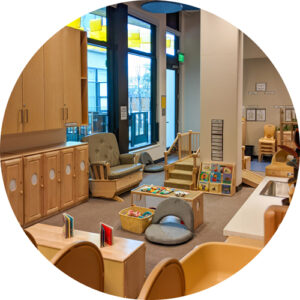 Opened in 2022, the Solmar Learning Center (SLC), co-located in Casa Adelante, is a powerful example of this approach. Located within an affordable housing development, SLC allows families to drop off their children just steps away from their home before heading to work, reducing logistical challenges and emotional and financial stress. Dr. Quiróz often articulates the urgency and scale of Felton’s commitment to quality ECE for low-income families in San Francisco: “The need for quality ECE is greater now than ever. Felton Institute has chosen to play a significant role by continuing to advocate for, expand on, and address access to quality care and education for San Francisco’s low-income families.”
Opened in 2022, the Solmar Learning Center (SLC), co-located in Casa Adelante, is a powerful example of this approach. Located within an affordable housing development, SLC allows families to drop off their children just steps away from their home before heading to work, reducing logistical challenges and emotional and financial stress. Dr. Quiróz often articulates the urgency and scale of Felton’s commitment to quality ECE for low-income families in San Francisco: “The need for quality ECE is greater now than ever. Felton Institute has chosen to play a significant role by continuing to advocate for, expand on, and address access to quality care and education for San Francisco’s low-income families.”
In addition to SLC, we are opening two other co-located centers. The Amani Learning Center (ALC), launching in early 2026 as part of the Sunnydale HOPE SF Block 3 project, will transform the Sunnydale-Velasco area into a thriving mixed-income community with over 11,000 square feet of high-quality ECE and family support space.
Stanyan Learning Center, opening summer 2026, is a collaboration between TNDC and CCDC, housed within a new 160-unit, 8-story apartment building on Stanyan Street, San Francisco. As Dr. Quiróz says, “Parents can walk downstairs to drop off their children, confident they’re safe while adults work.”
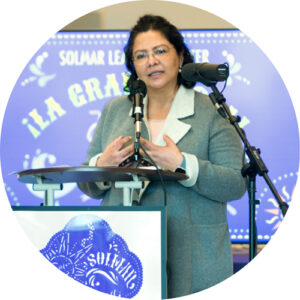 Director Ingrid Mezquita of the San Francisco Department of Early Childhood adds, “This is about family, community, vibrancy, and health.” Ingrid Mezquita continued, “Our investments are over one and a half million dollars, in just capital alone, helping the neighborhood develop this site. But that doesn’t include the funding that we provide so children can come to these programs. Hopefully, we can partner even more because the need is great. And that’s what the San Francisco Department of Early Childhood is there for, to be able to partner with organizations like Felton.” She emphasized that it’s all our responsibility to contribute to the health and education of our children.
Director Ingrid Mezquita of the San Francisco Department of Early Childhood adds, “This is about family, community, vibrancy, and health.” Ingrid Mezquita continued, “Our investments are over one and a half million dollars, in just capital alone, helping the neighborhood develop this site. But that doesn’t include the funding that we provide so children can come to these programs. Hopefully, we can partner even more because the need is great. And that’s what the San Francisco Department of Early Childhood is there for, to be able to partner with organizations like Felton.” She emphasized that it’s all our responsibility to contribute to the health and education of our children.
Supporting Early Education, Development & Socialization (SEEDS): A New Response to Community Needs
“We’ve figured out that to truly be effective,” shared Dr. Plern Pratoommas, Director of Program Quality and Impact, “we must work within the framework of the whole community. Everyone, parents, teachers, therapists, even housing partners must be part of a shared system of care.”
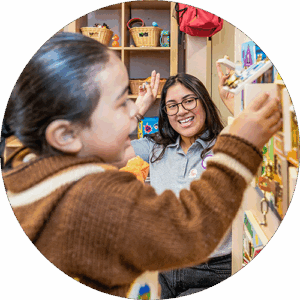 In 2024, Felton launched Supporting Early Education, Development & Socialization (SEEDS) to directly respond to long-standing gaps in early intervention access, including long waitlists and delayed services. As part of San Francisco’s Early Connections initiative, SEEDS delivers free, inclusive developmental playgroups for children ages 0–5 with suspected or moderate delays, offering critical support during a child’s most formative years. Through SEEDS, families of children with mild delays or suspected disabilities are connected early to inclusive developmental playgroups, care coordination, and supportive services, long before formal diagnosis or special education is in place. The program integrates playgroups, personalized care coordination, and peer-led parent groups to build confidence, connection, and community. By weaving together early learning, family engagement, and system navigation, SEEDS ensures families aren’t left waiting; they’re moving forward, together. Ingrid Mezquita, Executive Director of the SF Department of Early Childhood, underscores why inclusivity matters. “Babies’ brains are developing at an astonishing pace. Programs like Felton’s don’t just support development, they shape it.”
In 2024, Felton launched Supporting Early Education, Development & Socialization (SEEDS) to directly respond to long-standing gaps in early intervention access, including long waitlists and delayed services. As part of San Francisco’s Early Connections initiative, SEEDS delivers free, inclusive developmental playgroups for children ages 0–5 with suspected or moderate delays, offering critical support during a child’s most formative years. Through SEEDS, families of children with mild delays or suspected disabilities are connected early to inclusive developmental playgroups, care coordination, and supportive services, long before formal diagnosis or special education is in place. The program integrates playgroups, personalized care coordination, and peer-led parent groups to build confidence, connection, and community. By weaving together early learning, family engagement, and system navigation, SEEDS ensures families aren’t left waiting; they’re moving forward, together. Ingrid Mezquita, Executive Director of the SF Department of Early Childhood, underscores why inclusivity matters. “Babies’ brains are developing at an astonishing pace. Programs like Felton’s don’t just support development, they shape it.”
Watch Video: Discover the SEEDS Program
Stories that Inspire
Marvin’s Journey From ECE Alumni to Elementary School Teacher
At this year’s preschool graduation, our featured keynote speaker, Marvin, spoke about his experiences with ECE as a child and the profound impact it has had on him as an adult. Now a 4th-grade teacher in East Oakland, he returned to Felton to share a message 28 years in the making:
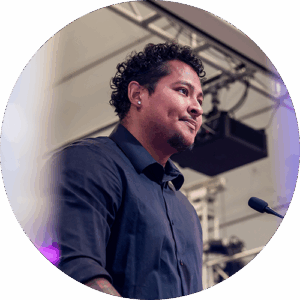 “Yes, 28 years later, I, in fact, attended one of Felton’s ECE programs here when I was just a few months old, before I could even speak! My mother was a 16-year-old single parent at the time, pursuing her GED, and I attended one of Felton’s daycares while she was in high school.”
“Yes, 28 years later, I, in fact, attended one of Felton’s ECE programs here when I was just a few months old, before I could even speak! My mother was a 16-year-old single parent at the time, pursuing her GED, and I attended one of Felton’s daycares while she was in high school.”
“There were times when my mother wondered if what she was doing was truly the best path for my future. One of those times was a night when she lay in a bunk bed at a shelter with her 3-year-old son (me) and another child on the way. “Now, I know,” Marvin continued, “it sounds good: a single teenage mom who immigrated here at 8 years old from El Salvador eventually raised a son who would later go to college, earn a master’s degree, and become a teacher. It’s your typical American Dream story… but it did not come without many challenges.”
Marvin reminded families that while his road wasn’t easy, what carried them forward was love and the support of programs like Felton’s. He closed his speech with a message that captured everything Felton believes in. “No dream will be too great. Love will be enough for you to build the future leaders of this community, who are on this stage right now.”
Watch Our 2025 Preschool Graduation Recap Video
Centering Care, Changing Futures
Another inspiring story comes from Elijah. Elijah’s experience speaks to the heart of what Felton stands for. Born with cerebral palsy, Elijah required more than therapy appointments; he needed a circle of care wrapped around him and his family. “Knowing that therapists come here, that everyone is part of his care team, it’s incredible,” his parents shared. “We’re so lucky to have this support. We feel seen, and Elijah is thriving because of it.”
At Felton, services aren’t siloed; they’re integrated, relational, and accessible. Elijah’s journey shows, how when support is brought into the classroom and aligned with family needs, children with complex challenges can experience success in real time, with real results.
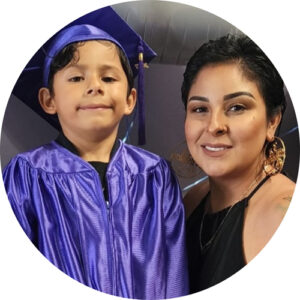 Alejandra Cuellar, a parent whose children attended Felton years ago, still carries that experience with her. These are more than anecdotes. They’re proof points that demonstrate the impact of a whole-child, whole-family approach, one that doesn’t wait for families to ask for help but wraps support around them from day one.
Alejandra Cuellar, a parent whose children attended Felton years ago, still carries that experience with her. These are more than anecdotes. They’re proof points that demonstrate the impact of a whole-child, whole-family approach, one that doesn’t wait for families to ask for help but wraps support around them from day one.
Because our work isn’t about checklists or compliance.
It’s about people, real families, real hopes, and real change.
Looking Ahead
This year’s expansion isn’t just about geography; it’s about purpose. It’s about anchoring sites where families live and struggle. It’s about weaving partnerships across housing, education, health care, and workforce development. And it’s about laying the groundwork to launch.
What’s Next: Bold Growth, Deeper Impact
As the Bay Area’s cost-of-living continues to outpace the struggle against opportunity, Felton remains unwavering in our mission. With more sites to come, we are prepared to deliver affordable, high-quality ECE paired with mental health and family support into more underserved neighborhoods. Every child deserves to be seen, supported, and celebrated. Every family deserves dignity, stability, and hope. Every community deserves services that honor lived experience, build resilience, and unlock potential.
At Felton, we’re honored to accompany families on their journey yesterday, today, and tomorrow.
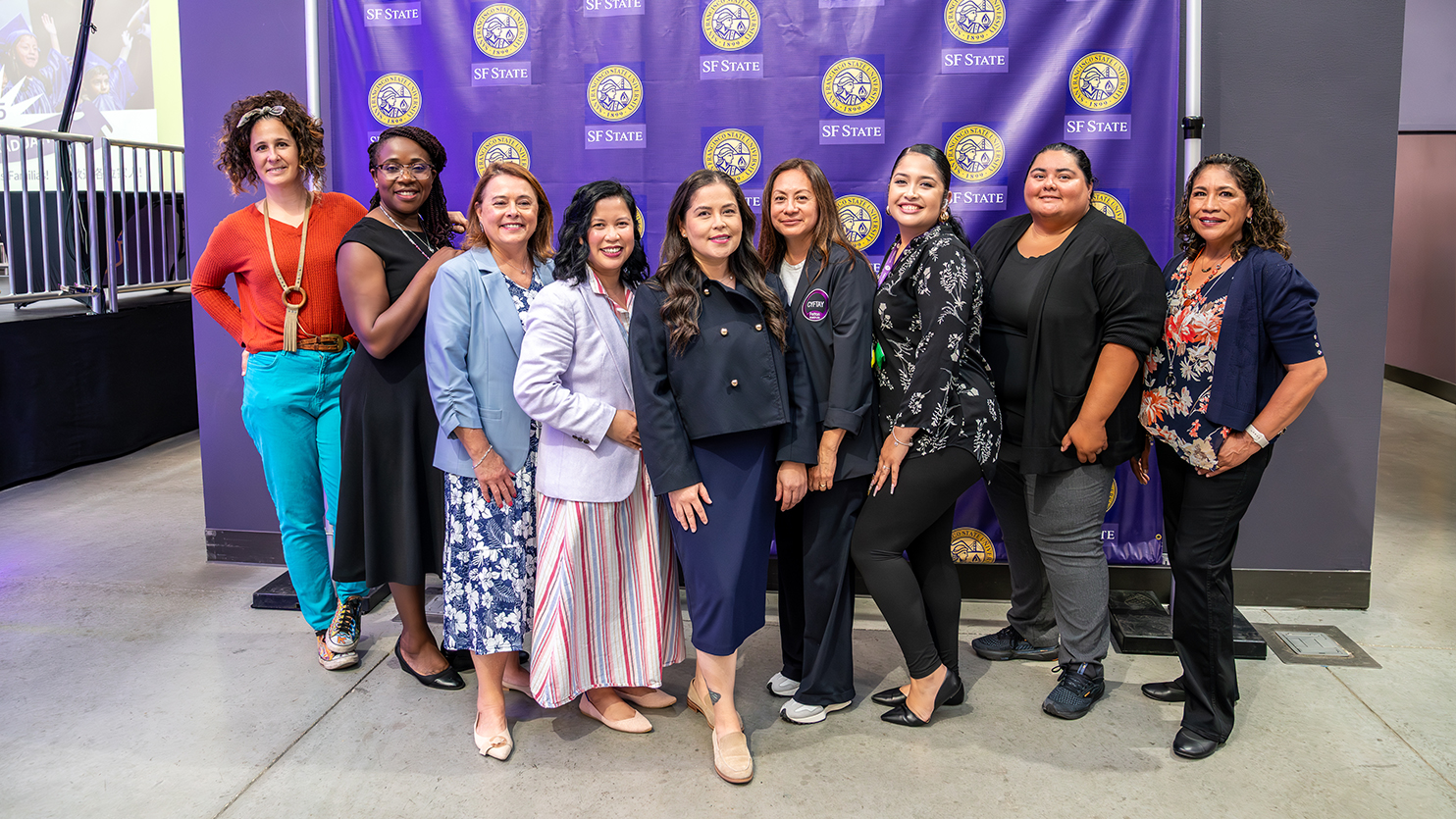
Guided by Partnership, Fueled by Support
This work is possible thanks to the generous public and private funders:
- San Francisco Department of Early Childhood (SF DEC)
- California Department of Education (CDE)
- California Department of Social Services (CDSS)
- And many private foundations and partners who are committed to community-led change
To each of you, we extend our deepest gratitude. Your vision and investment fuel every classroom, every milestone, and every story.
Felton Institute responds to the needs of our community by providing innovative, evidence-informed social services to transform lives. Our organization offers 50+ programs that address mental health, the unhoused, early care and education, those impacted by the justice system, transitional age youth, as well as aging adults. Our award-winning programs, which have been recognized as national models, combine the latest scientific research with cultural sensitivity and a deep commitment to supporting and reflecting the communities we serve.
Founded in 1889, Felton is the oldest secular non-profit social services provider in the City and County of San Francisco. We have expanded our services across most Bay Area counties and continue to be at the forefront of pioneering new approaches to meet the emerging needs of underserved populations.
We know what it looks like to successfully build community.
We foster impactful change by strengthening the community as a premiere service provider. We also strengthen other service providers by supporting them in their fiscal, human resources, communications, IT and overall agency operations. With Felton’s support, they are able to focus on providing the best services to their clients, doing the work they were meant to do.
Felton empowers the community and ensures successful outcomes to all we engage with.
Felton Institute is a tax-exempt organization registered 501(c)(3) nonprofit under EIN 94-1156530.
